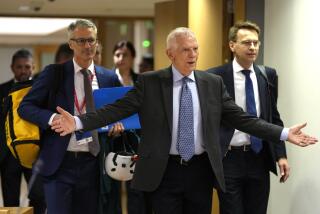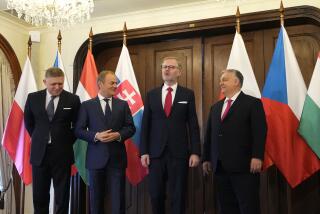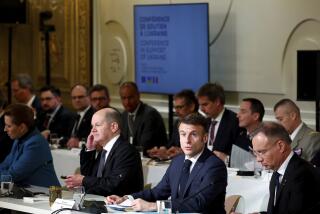Ukraine lawmakers approve EU pact, offer autonomy to rebel regions
Lawmakers in Ukraine endorsed an association agreement with the European Union on Tuesday, making a decisive turn in favor of closer relations with Western neighbors in spite of the 10-month-old conflict that shift in alliance has ignited with Russia.
In a move probably intended to soften the blow to Moscow of its slipping influence over Ukraine, the deputies of the Supreme Council also approved a three-year period of greater autonomy for the separatist-occupied areas of eastern Ukraine and amnesty for most of the pro-Russia militants who have been fighting against rule from Kiev.
“Those who live in Donetsk and Luhansk must have a possibility to elect new authorities for themselves and we must find understanding with these authorities and bring peace, calm, accord to the state,” President Petro Poroshenko said in televised remarks after the closed-door parliamentary session that adopted the autonomy plan.
The deputies proposed the separatist-held areas carry out elections for regional leadership and deputies to the national parliament in November. The areas of Ukraine under government control have set parliamentary elections for Oct. 26.
At the closed parliamentary session, lawmakers also approved an offer of amnesty for rebel gunmen who lay down their arms and leave government buildings they have occupied since March. The offer does not extend to those who have committed major crimes, the deputies stipulated, including those suspected of shooting down a Malaysia Airlines passenger jet on July 17 and killing all 298 on board.
The legislative moves, reported by the Ukrinform news agency, were met with skeptical pledges by some separatist leaders to consider the offered concessions and by others with denunciation as far short of the full independence they seek from Ukraine.
Poroshenko must first sign the autonomy bill and bring it into force, Alexander Zakharchenko, the self-proclaimed prime minister of the separatist Donetsk People’s Republic, told Russia’s RIA Novosti news agency.
“Then we will translate it into Russian, study it and give our opinion,” Zakharchenko said.
But another Donetsk separatist leader, Andrei Purgin, told news agencies that anything short of independence from Ukraine was “unacceptable.”
“This is nonsense when the Rada [Council] of Ukraine passes bills not for Ukraine, but for Donbas,” Purgin was quoted by RIA Novosti as saying, referring to the separatist-held territory in the industrial Don River basin. “We have our own parliament for this purpose.”
At the Ukraine Crisis Media Center in Kiev, Col. Andriy Lysenko of the National Security and Defense Council told reporters that separatist and Russian troops continued to violate an 11-day-old cease-fire over the previous 24 hours, lobbing shells at government positions in at least five towns.
In the Shakhtarsk district of Donetsk, “terrorists and Russian servicemen are accumulating military armored equipment: tanks and APCs [armored personal carriers], and using mine launchers to attack residential areas within the city under the guise of National Guard,” Lysenko said.
Monitors of the Organization for Security and Cooperation in Europe, who are deployed in the conflict area with the agreement of Ukraine and Russia, also reported multiple artillery blasts in violation of the Sept. 5 agreement to halt fighting and negotiate a permanent end to the conflict. The reports did not pinpoint the origins of the shelling but appeared to suggest involvement by both government troops and separatist fighters.
More than 3,000 people have died in six months of fighting in eastern Ukraine, and hundreds of thousands have fled their homes for safer refuge in Russia or Western Ukraine.
The European Union association pact was the catalyst for the crisis that has consumed Ukraine since November, when former President Viktor Yanukovich refused to sign it at an EU summit after three years of negotiating the trade deal. European-leaning Ukrainians in Kiev and other Western cities revolted against Yanukovich, staging round-the-clock demonstrations until finally driving him to flee to Russia in February.
Russian President Vladimir Putin condemned the toppling of Yanukovich as an illegal coup d’etat by right-wing groups and sent Russian paratroopers to Ukraine’s militarily strategic Crimean peninsula to seize the Black Sea territory. He annexed it to the Russian Federation less than three weeks later on March 18.
Putin has also threatened to impose import restrictions on Ukrainian goods if the EU association deal, which could allow tariff-free import and re-export of European products via Ukraine, results in damage to the Russian economy.
Ukraine’s parliamentary approval of the association deal, by all 355 deputies in attendance, was synchronized to the European Parliament’s vote in Strasbourg, France. The agreement is expected to come into force by Nov. 1, Ukrinform reported.
Poroshenko alluded to the deadly conflict gripping the country as a cost exacted for Ukraine’s first step on the path to eventually joining the 28-nation EU.
“Since World War II, no nation has ever paid such a high price to become Europeans,” he told parliament.
Some analysts expressed worry that the plan to broaden the autonomy of the rebellious regions would hand the Kremlin its desired influence over the largely Russian-speaking areas of eastern Ukraine rather than foster a lasting peace.
Vadim Karasyov, director of the Institute of Global Strategies, said the attempt to draft a new status for the regions would prove a “shaky compromise with Moscow,” which Kiev accuses of arming and instigating the separatists with the aim of retaining Russia’s historic dominance of its neighbor.
Some analysts expressed worry that broadening the autonomy of the rebellious regions would hand the Kremlin its desired influence over the largely Russian-speaking areas of eastern Ukraine rather than foster a lasting peace.
Vadim Karasyov, director of the Institute of Global Strategies, said the attempt to draft a new status for the regions would prove a “shaky compromise with Moscow.”
“Poroshenko tries to present it as a serious step of his peace plan but Putin may take advantage of it and see to it that huge gray areas in the volatile regions remain under Russia’s control,” warned Yuri Butusov, a defense expert and editor of the popular online publication Tsenzor.net.
Loiko reported from Kiev and Williams from Los Angeles. Special correspondent Victoria Butenko contributed to this story from Kiev.
Follow @cjwilliamslat for the latest international news 24/7
More to Read
Start your day right
Sign up for Essential California for news, features and recommendations from the L.A. Times and beyond in your inbox six days a week.
You may occasionally receive promotional content from the Los Angeles Times.







